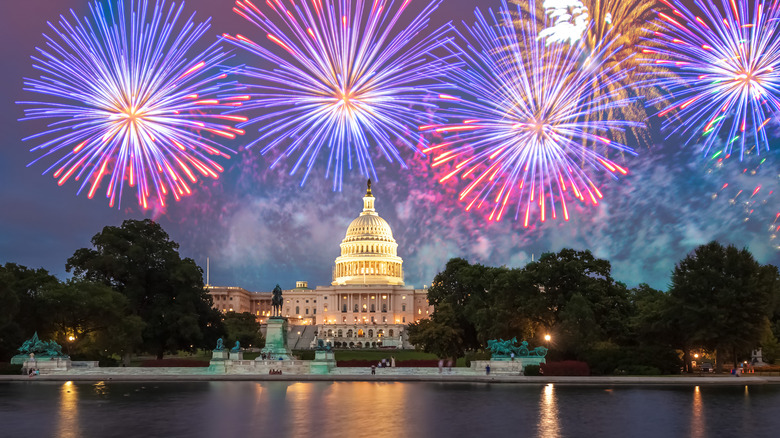What Needs To Happen To Create A Federal Holiday
In June 2021, President Joe Biden signed an executive order into effect declaring June 19 a federal holiday (via NPR). The bill had passed Congress that month with little pushback. Juneteenth, or the date commemorating the end of slavery two years after the Emancipation Proclamation, had long been celebrated by many as a holiday. How did it now achieve federal status? And what does that even mean?
The president of the United States, as luck would have it, has exclusive jurisdiction over several things: the nuclear button, the color of the curtains in the Oval Office, and the establishment of each year's federal holidays — temporarily, at least. Any president can sign an executive order declaring a date a federal holiday on a temporary basis. George W. Bush did just that in 2004 with his impromptu canonization of Ronald Reagan's birthday, according to Slate. To make it permanent, however, Congress must hold a vote and rule whether or not to amend the United States' existing code of federal holidays, a roster with no more than 11 dates as of this year (via U.S. Code § 6103 – Holidays).
States Can Have their Own Holidays
What is a federal holiday? Celebration is hardly an American attribute government-made to dispense, but time away from your job at a federal office to engage in celebration is within the government's power. The Federal Reserve Bank explains that federal holidays mandate closings of federal offices (and most banks) and the activation of holiday pay for the employees who work there. The same isn't true for states, however. A federal holiday might close every federal bank in Virginia, for example, but unless Virginia's state government also chooses to recognize that holiday, the state government's agencies remain open.
Just as states can ignore federal holidays, states can also create brand new holidays all their own without waiting for the approval of the federal government. For example, Juneteenth has been a state-sanctioned holiday in Texas since 1980 (via CNN).
Abraham Lincoln's birthday on February 12 is a sacred date in New York and New Jersey, while Alabama celebrates Jefferson Davis's birthday the first Monday in June. Utah celebrates Pioneer Day on July 24, and Alaska celebrates Alaska Day on October 14 each year (via InfoPlease). And finally, neither the state nor the federal government can tell private sector businesses which dates it may or may not operate or close down.
To Become A Federal Holiday, A Bill Must Pass Congress
To create a new federal holiday, a bill must be proposed in Congress, which must then pass both the House and the Senate, then garner the signature of the sitting president. The two most recent successful efforts to amend the federal holiday schedule — the establishment of Juneteenth National Independence Day in 2021 and Martin Luther King, Jr. Day in 1983 — were not the only recent attempts. In 2011, former Rep. John Conyers (D—Mich.) proposed the addition of Election Day to the roster of federal holidays (via Constitution Center), but the movement didn't gain traction. In 2021, Rep. Grace Meng (D-NY) introduced her own proposal to make Lunar New Year Day a federal holiday, but didn't get much success either (via FedSmith). Both triggered talk of the eternal specter of all things government: the budget.
According to Forbes, each federal holiday costs the U.S. government approximately $818 million to observe. FedSmith estimated the actual cost of observing all eleven certified federal holidays could be as high as $8,998,000,000.


